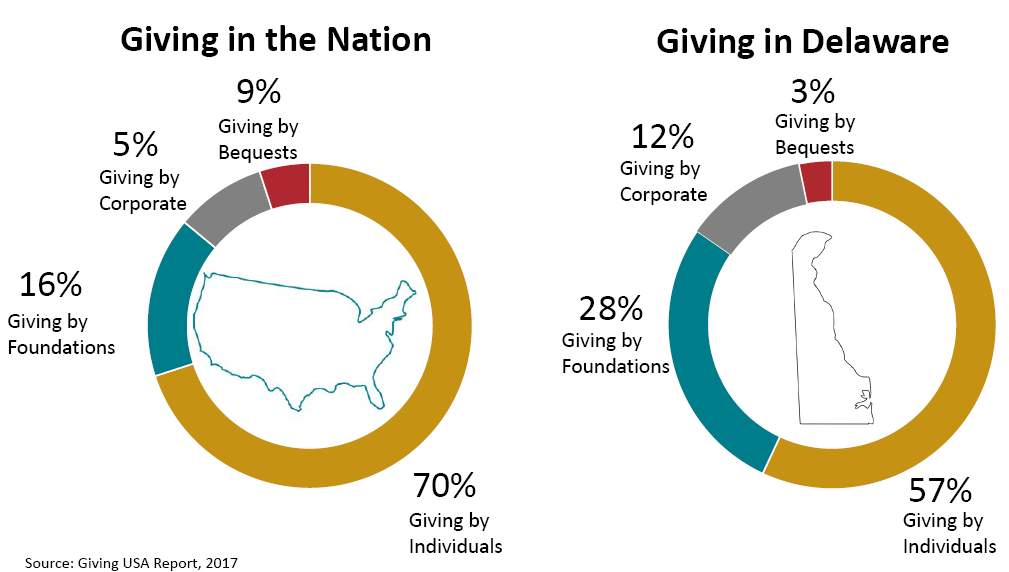On November 12, 2019, I had the pleasure of facilitating a panel for National Philanthropy Day on the Delaware Funding Pie. Delaware Pie.pdf
The panel delved into all the various funding sources that are available to nonprofits in the state of Delaware and the current trends and issues around those funding sources.
The panel included Philanthropy Delaware members: Amy Walls, Principal, Community Affairs at Discover bank, There DuPont, President of the Longwood Foundation, and Stu Comstock Gay, President and CEO of the Delaware Community Foundation.
The areas discussed were: Corporate Funding, which I will address is this blog; Community Reinvestment Act Investments; Donor Advised Funds, Endowments, Foundation Funding and Individual Donors.
Delaware is unique in that its Foundation and Corporate giving are both double the national average with individual donors 18% lower than the national average.

Delaware nonprofits have been fortunate to be the beneficiaries of significant corporate dollars over the years. We hope for that to continue, but that will be dependent on if the work and data supports the investment trends of the corporate sector.
Corporate funding continues to go through various iterations as organizations determine what is the best methodology for them to do their philanthropy. One change we're seeing across multiple organizations is that of generalized philanthropy moving into much more strategic corporate social responsibility noting that “social” responsibility being the key component of this. There is a mindset that when corporations support the key causes in strategic ways—when they get the right place and the right investment—they create momentum for critical change.
There is a trend for corporate funding giving to less organizations and aligning with a handful of organizations and putting much larger gifts to projects issues and partners. Another thing to be aware of is the trend for companies to align their philanthropic giving to the return on investment within their organizations. Focused efforts drive all-around impact. Evolving away from general philanthropy toward causes that are more tightly aligned with their corporate DNA and other company initiatives. This reflects a desire to be strategically consistent and to concentrate giving that produces the most impact.
We also see a change to a philanthropic mindset with corporate culture. Companies are also moving their corporate social responsibility out of their External Communications department into Human Resource departments, Sustainability departments and even in separate departments altogether in order to align more with the company. Moving from part of to culture of methodology.
At the presentation, I gave examples of companies that have made shifts in the last several years. Here I will not name the companies, but the drivers for the change.
1. Employee Preference: One company changed their focus after surveying the employees and employee engagement efforts to determine that the employees felt they were not investing where they should. The company made a complete shift in their philanthropic grantmaking.
2. Ethical Business Practices: One company realized that product they received directly from the supplier versus a third party vendor that was acquired via a workforce system of unreasonable wages and substandard conditions. Their philanthropy became a time, talent, and treasure investment into helping design the infrastructure for best labor practices for the complete supply chain.
3. Employee Acquisition and Economic Mobility: One company chose to invest in the training and development of their employee pool through workforce development programs in the community targeting those that previously may have had limited income potential. Providing them with training and good paying jobs.
All of these examples that remind us that philanthropic investments can benefit the donor is ways that is not always measured by tax incentives, but the desire to improve the bottom line, employee satisfaction, communities in which companies reside and to have the workforce for the future.
Cynthia Pritchard, President and CEO Philanthropy Delaware.
